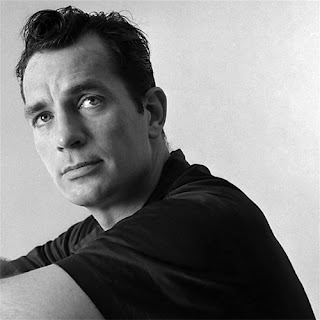I read On The Road when I was young and it had a major impact and influence upon me. It is clear, poetic, raw, and written with an enthusiasm for life. It is a story of a passionate friendship and a search for revelation. Kerouac takes us through the highs and lows of hitchhiking and bonding with fellow travellers. On The Road expresses the restless energy and desire for freedom that makes people rush out and see the world. It is a cross-country bohemian odyssey that not only influenced writing in the years after its publication but also penetrated into the deepest levels of American thought and culture.
On The Road was published by Viking Press in 1957. It is an autobiographical work based on Kerouac's spontaneous road trips across America. It is one of the defining works of the Beat Generation that was inspired by jazz, poetry, and experimentation with drugs. It is a work of fiction but many of the characters are based on real-life people and friends of Kerouac's including Neal Cassady, Allen Ginsberg, and William Burroughs.
The myth is that Kerouac wrote On The Road in a three week period in 1951, typing continuously onto a 120-foot roll of teletype paper. This is true to a certain extent, but Kerouac had kept notebooks on his road trips from which he worked. He had actually started an earlier version in 1948 based on his first long road trip in 1947. Neal Cassady wrote him a 1000-word rambling letter in 1950 that inspired Kerouac to outline the "essentials of spontaneous prose" and tell the story of his years on the road. He wanted the novel to be like a letter written to a friend in a form that reflected the improvisational fluidity of jazz. The first draft was then produced on the roll in 3 weeks in April 1951. Over the next several years revisions were made and sections omitted and inserted, before it was finally published in 1957.
The narrator is Sal Paradise (Kerouac) and the catalyst for the adventures to come is his friend Dean Moriarty (Cassady). In the beginning Sal sees Dean as the epic hero because of his free nature, and his reluctance to conform to social demands. Dean had been in prison which solidified Sal's view of him and prison had fueled Dean's obsession with the road and the need to be free. Sal is fascinated with humanity, with his friends, jazz, the landscapes of America, and women.
Sal takes off for Chicago, marking it as specific area of jazz history, somewhere between the bebop of Charlie Parker and the cool period that began with Miles Davis.
The automobile keeps Sal and Dean constantly in motion. Dean's madness is glorified and he does whatever he pleases. There are drugs and liquor, and a character loosely based on William Burroughs is into heroin. Women drift in and out and Dean treats everyone terribly, but still Sal sees him as a god-like hero.
As the book evolves, Sal becomes less idealistic about the road and being down and out, and his reverent tone for Dean changes to one of disappointment. When confronted about his abandonment of his wife and child, Dean falls silent. Sal notes that "in the past Dean would have talked his way out, but now he fell silent....He was BEAT."
Sal's last trip is through the Mexican countryside to Mexico City with Dean and another traveller they had met in Denver. They have a marijuana-infused introduction to Mexican culture, including a vivid and expensive sojourn to a bordello complete with mambo music and underage prostitutes.
Sal gets dysentery in Mexico City and Dean abandons him feverish and hallucinating. Sal reflects that "when I got better I realized what a rat he was, but then I had to understand the impossible complexity of his life."
The novel ends a year later in New York, after a plan to move to San Francisco with Dean falls through, and Dean ends up going by himself. Sal ends up on a pier reminiscing about God, America, and the idea that "no one knows what is going to happen to anybody besides the forlorn rags of growing old."
On The Road takes you on a quest across America that you can see, smell, and feel. It inspired me to travel myself. Once, I hitchhiked from Tulsa, Oklahoma to San Francisco and back again with a friend, even spending three days in jail in Wanatchee, Washington. I experienced the highs and lows, living on peanut butter, down to a few bucks and still being a thousand miles from home, and then catching that magical ride all the way from Flagstaff to Oklahoma City. Another time I hitched with another friend to Mardi Gras which included sleeping under a bridge underpass in Mississippi. Many times, I took the bus between Tulsa and New York. Just thinking about it makes me want to chuck it all and hit the road, but of course we are tied down by responsibility.
On The Road is a great book that expresses the outlaw spirit that was the underbelly of conformist 1950s America.



No comments:
Post a Comment